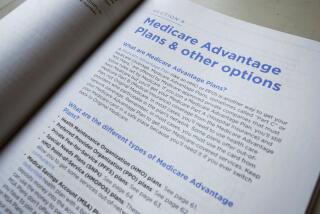Maximizing 2013 healthcare benefits by year’s end
Getting to see the doctor before the year is over has been on Dave Holt’s mind.
The 52-year-old employment attorney from Tustin says he’s been putting off a visit for some time. “I haven’t done my annual physical yet,” he says. He and his wife also rush at the end of each year to make sure their three kids are current with their immunizations and checkups.
With less than two weeks left in 2013, now is the time to think about your healthcare benefits and whether you have used them to their fullest before time runs out.
“If your health plan resets in January, you want to make sure you’ve taken advantage of those once-a-year benefits like annual checkups and screenings,” says Amy Bergner of consulting firm PricewaterhouseCoopers.
There are a variety of strategies that experts suggest to avoid leaving money on the table in 2013.
Know what’s changing. “The first thing I would tell people is be sure that you understand what changes are being made to your benefit package for next year,” says Jody Dietel of WageWorks, which administers employer-based benefits. “The onus is on the individual to understand what’s happening with their benefits.”
Maybe your plan’s out-of-pocket costs or your prescription drug plan is changing. Maybe your employer has switched the type of insurance you have from a traditional health policy to a high-deductible plan with a health savings account.
In some cases, it may make sense to schedule medical appointments before the year ends, especially if your costs are going up next year.
On the other hand, maybe you’ll want to wait until 2014 — if you’re among the lucky few who signed onto a plan with richer benefits for next year. You need to do the math.
Use your annual benefits to the max. Many benefits are good only for a single calendar year. Often, people forget about them and the benefit goes unused.
“Don’t forget annual benefits under the dental or vision plan, like a pair of glasses or contact lenses or a dental cleaning,” Bergner says.
Make the most of your deductibles. Deductibles — the amount of money you’re required to pay out of your own pocket before insurance covers all or part of your healthcare services — are becoming more expensive.
Today, a person with single employer-based coverage pays an average of about $1,100 in medical bills before insurance kicks in, according to the Kaiser Family Foundation, based in Menlo Park, Calif.
If you’ve met your health plan’s 2013 deductible, now may be a good time to schedule any medical treatment you’ve been delaying.
“You want to incur expenses this year if you’ve already reached your deductible or out-of-pocket maximum,” Bergner says. And think now about what lies ahead for 2014. In some cases, it may pay to wait on expensive medical treatments.
“If you are certain you’re going to have a large expense and it can help you fully or partly satisfy your [2014] deductible, you could consider putting it off,” she says.
Fill prescriptions before the year is up. You may be able to put in a mail order for a 90-day supply of medications now to avoid having to fill another prescription until after the first few months of the year. According to Bergner, that’s a particularly smart move if you’ve already satisfied your plan’s deductible.
Also, check to see whether there are any changes in the list of drugs for which your insurer will pay. If your medications will cost more in 2014, it may pay to fill your prescription now at a lower cost.
Make the most of tax-saving health funds. Tax-advantaged health accounts, including flexible spending accounts, often have a shelf life. If you don’t use the money deposited during the year, you may lose it.
“You’d be surprised how many people don’t realize they have an FSA even though they’ve had money deducted all year,” Dietel says. On average, she says, people forfeit about $120 each year in their FSA accounts.
The use-it-or-lose-it nature of these accounts often leads consumers to shop in bulk, says Hugo Sibrian, chief executive of Benefits & Risk Solutions Inc., a benefits consultant based in Los Angeles.
Although it’s smart to stock up on health-related items by year end, such as contact lens solution and nasal spray, last-minute shopping sprees can turn wasteful. If not in danger of losing money, Sibrian says, people “wouldn’t otherwise buy so much.”
Many employers allow for a grace period of up to two and a half months, or by mid-March of 2014, to spend FSA money. In addition, the IRS recently announced a change in FSA rules. At the discretion of employers, you may carry as much as $500 into the following year.
With time running short, the Holt family of Tustin is taking action, says father Dave Holt. “We’ll all be getting our annual physicals before the holidays are over.”
Zamosky is the author of a new book, “Healthcare, Insurance, and You: The Savvy Consumer’s Guide.”






